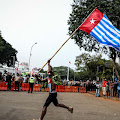Indonesia last week had two Presidents. One was Parliament Speaker Sartono, who was sworn in as Acting President before a heavily guarded convocation of Djakarta dignitaries, and the other was President Sukarno himself, who kept saying he was going off to India for a rest cure, though he seemed more interested in hanging around to see how the Acting President would make out.
Acting President Sartono had his work cut out for him. In the three weeks since Sukarno launched his campaign to seize Dutch-owned commercial enterprises and expel their owners, Indonesia's ever-shaky economy had deteriorated sharply. In the Djakarta port area alone, some 30,000 workers were idle. Imports were off by 80%. The price of rice had doubled. Already the government is dipping into its "iron reserve" of rice stores, nominally designated for use only in the event of war or national emergency. Djakarta printing presses were at work turning out 400,000 rice ration cards and government employees began receiving part of their pay in low-priced, government-supplied rice.
Helpless Fury. Distribution was the major problem, and in Indonesia's island republic, that meant ships. But most of Indonesia's ships are Dutch, and so are the captains. There are hardly any Indonesian pilots, and government officials dared not order Dutch captains to sea lest they surrender their ships to hovering Dutch warships. As the government's fury at its own helplessness mounted, Premier Djuanda and Army Chief of Staff Major General Abdul Haris Nasution arbitrarily ruled that "all waters around, between and connecting the islands belonging to the Indonesian archipelago ... are an integral part of national waters, subject to the absolute sovereignty of Indonesia . . ." In Paris, Western diplomats promptly protested that this was an infringement of the freedom of the seas.
Indonesia's new ruling triumvirate had other problems. In Sumatra, Borneo and the Celebes, anti-Sukarno army colonels have long been conducting their own barter trade direct with foreign countries. The military commanders have been levying their own taxes, building their own roads and schools for nearly two years. In Singapore the colonels dealt through a foreign trade mission they had appointed themselves, over the head of the central government in Djakarta.
Changed Course. In the immediate future Indonesia's political fate may well hinge on the ability of 39-year-old General Nasution to win and hold the restless loyalty of the colonels. Some, while nominally accepting orders from Nasution, still feel he is too much under President Sukarno's spell. They claim that it is Sukarno's own political shortsightedness that has put the Communists on the road to becoming the strongest of all political parties in Java.
Last week General Nasution and Premier Djuanda seemed to be intent on proving themselves more responsible than Sukarno. General Nasution issued a flat "hands-off" order to Red-led SOBSI workers who wanted to seize the vast Royal Dutch Shell Co. holdings in Surabaya and Balikpapan. And at week's end Premier Djuanda announced that the fountainhead of the anti-Dutch campaign, Sukarno's Action Committee to Liberate West Irian (West New Guinea), had been dissolved, its functions taken over by the National Council.





.jpg)
